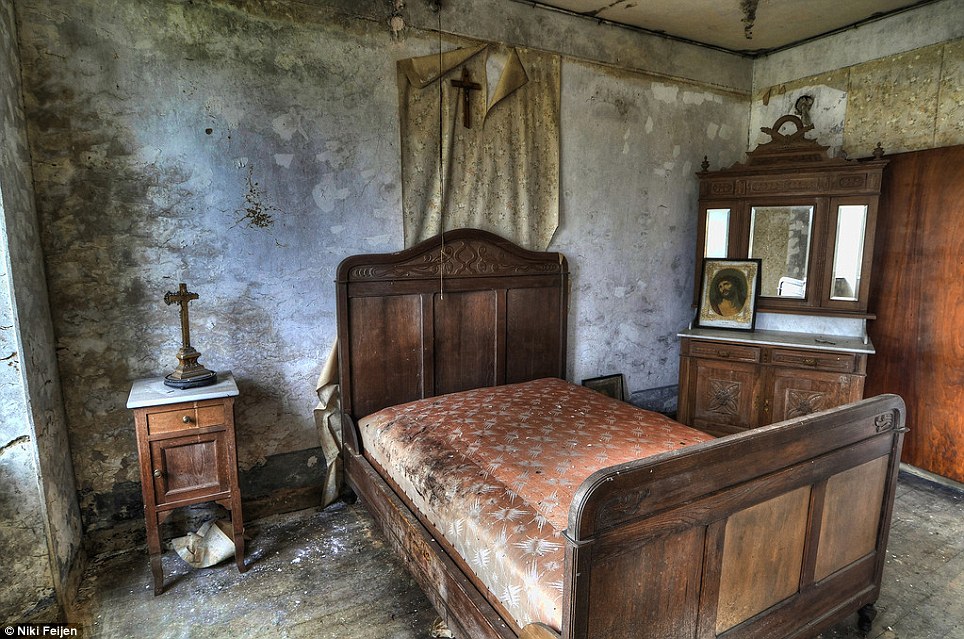Abandoned Homes in Europe
April 30, 2013
KARL D. writes:
—- Comments —
Karen I. writes:
This can be seen in this country on a smaller scale on Ebay, where religious items, most likely belonging to deceased elderly people, can be found for a fraction of their value. Their family members simply have no use for the items and often won’t even bother to clean them before sale. It is sad to think that prayer books, statues and medals, some cherished for a lifetime, end up this way. I recently paid $14, including shipping, for a “lot” of Catholic medals that the seller said may include silver items. Two were medals with relics in them. The seller said they could not be bothered to clean the items and that was the reason for the low price. Two of the medals were pure silver and one token was pure silver. Others were antiques. One item was a beautiful pendant made of silver that took a half hour of cleaning to reveal what it was.
I am happy to have the items, but it is still sad that not a single family member or friend of the deceased wanted the religious items. Even items from the armed services, like prayer books that belonged to soldiers at war, wind up on ebay.
I’ve seen the same sort of thing at Goodwill as well. Family bibles that were once the most cherished item in a home are lined up on shelves with cookbooks and pulp fiction. Religious statues and crucifixes of all sorts are mixed in with things like baskets and old dishes.
Teresa writes:
We need to look a bit deeper than apathetic children of deceased elderly tossing their parents’ religious items or putting them for purchase on Ebay.
Those of us that lived through Vatican II can well remember priceless objects simply thrown into dumpsters: statues, ciborium, chalices, monstrances, altar cloths, marble or precious wooden altar rails, Stations of the Cross, candle works, beautiful rosaries and bibles, pictures; not to mention, Catholic libraries jettisoning wholesale priceless books and manuscripts. If the elite or hierarchy of an institution (priests, bishops, cardinals) cares little for its precious objects, it’s little wonder that us little persons do likewise.
The revolt of the elite can never be underestimated in the decimation of a culture or civilization.
Laura writes:
Thank you for pointing that out.
People have been taught to view these items with indifference or scorn. We must never overlook the active desire to destroy.
Sebastien writes from Paris:
Our home is starting to look more and more like these homes in these photos. Ebay is a good source for these items and in Paris we can also find a shop selling items made in monasteries. The shop also sells lots of catholic antiques and the kindly staff volunteering to work there have little idea what many of the items are.
We have bought for example, the framed prayer cards that are present on every altar where the Tridentine Mass is celebrated. We explained to the lady selling them that it was the consecration prayer, the lavabo and the final gospel.
As Catholic truth as expressed in the Mass and in doctrine looks more and more like it’s going to be relegated to the catacombs, we feel the its important to buy what we can, so that when house masses become the norm, we are as prepared as we can be when we have the privilege of a pastoral visit.
As to the photos, I somehow doubt many are photographed in Holland. Holland is one the most Protestant (i.e. we all have our own version of the truth) and consquently liberal (i.e. we all have our own version of the truth) countries that I have been to.
BE writes:
Regarding Sebastien’s comment that Protestantism is essentially “we all have our own version of the truth,” I have noticed that many Catholics appear to misunderstand what [the Protestant concept of] sola scriptura means. The fundamental meaning of sola scriptura is that the Bible is the inerrant word of God, and that it is the ultimate authority on every topic it addresses. I believe that Catholics can agree with this. Where we differ is on the issue of who is to interpret the Bible.
For Catholics, only the Pope and the bishops have that authority. For Protestants, the individual can interpret the Bible, with the caveat that the church still has the authority to guide believers and rectify their mistakes. I can’t speak to what goes on in other churches, but in mine (the Orthodox Presbyterian Church), those who are mistaken in their interpretation would be corrected and guided first. If they persisted in their error, they could be counseled, disciplined, and ultimately, excommunicated. So no, we may not have our own version of the truth.
When I see someone criticize the notion that “we all have our own the version of the truth,” I see someone criticizing liberalism. In 1923, J. Gresham Machen wrote a book titled “Christianity and Liberalism.” In it, he identifies liberalism as a de facto religion hostile to Christianity; certainly we agree on that point. Chapter One identifies the nature of liberalism, and how it is distinct from, and inimical to, Christianity (when I first read it, I was struck by the similarity to Lawrence Auster’s writings on liberalism, 80 plus years later). Machen went on to identify and denounce the pernicious influence of liberalism within the church. Unfortunately, the liberals won that fight; traditionalists have been fighting a rearguard action since.
Laura writes:
Much can be, and has been, said on this subject. Let’s leave it at that for now.

